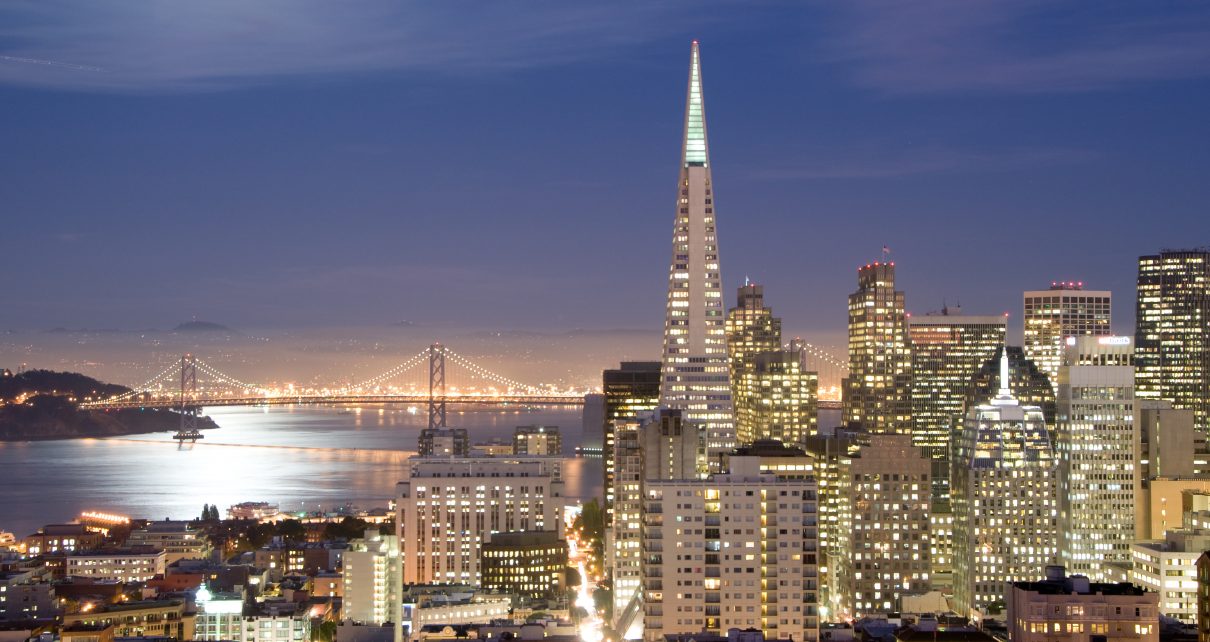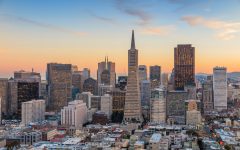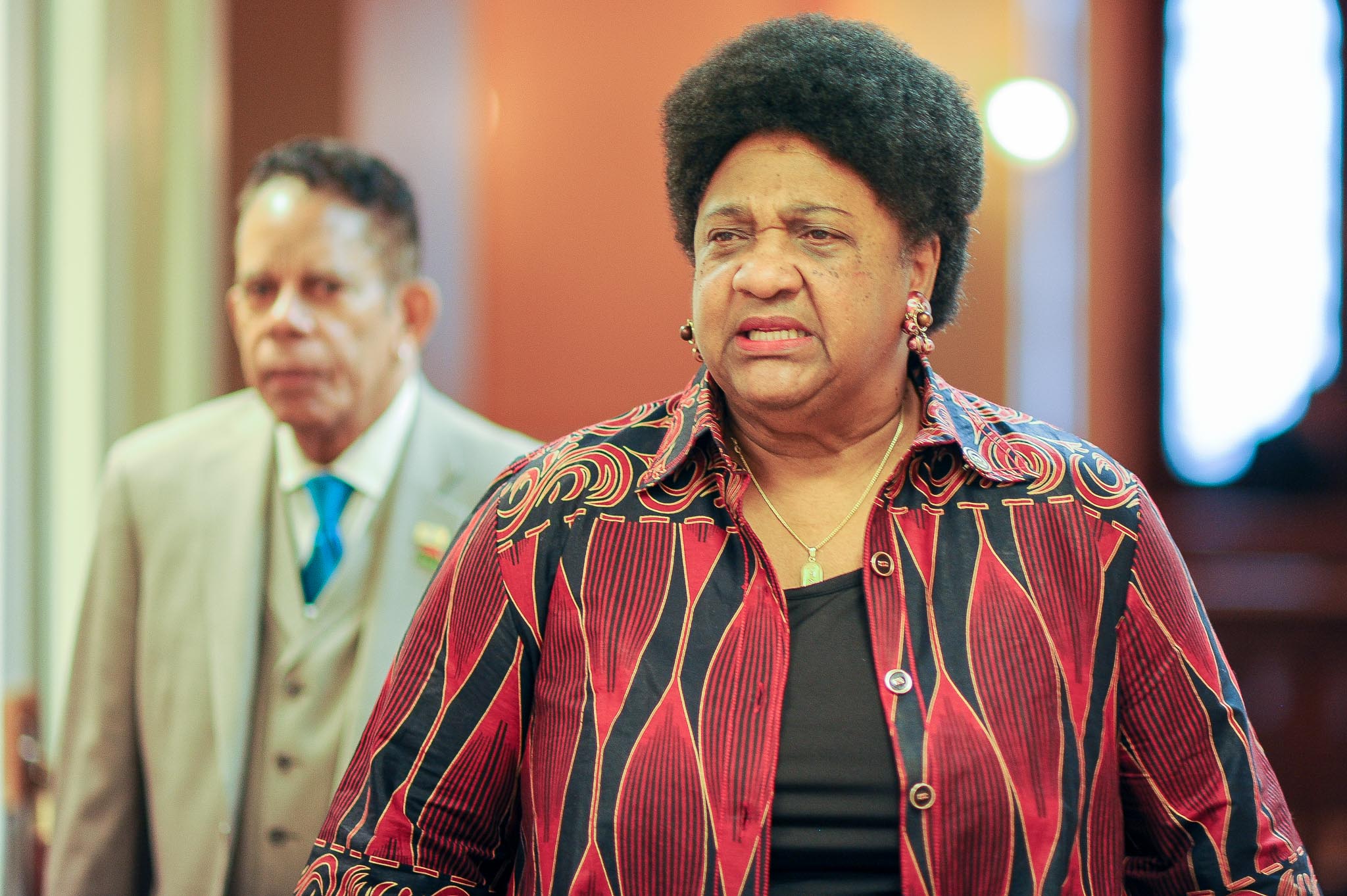
San Francisco financial district at night with the bay illuminated by the full moon. (Photo: CAN BALCIOGLU/Shutterstock)
San Francisco Board of Supervisors Hear Out $5 Million Per Person Citywide Reparations Plan
‘The majority of San Franciscans, both liberal and conservative, are against reparations at least of this magnitude’
By Evan Symon, March 15, 2023 2:30 am
Amid strong backlash from residents, the San Francisco Board of Supervisors signaled support for reparations recommendations on Tuesday, including $5 million for every eligible black adult in the city.
Since 2020, reparations for African-Americans has become a subject of major debate in California and across the country. A few cities have passed limited reparations programs, including a $25,000 housing allotment for black residents in Evanston, Illinois. In California, the Reparations Task Force is currently working on a proposal due in July, with current sticking points addressing who would be eligible and what exactly they would get.
It’s also very tenuous, as it is only a proposal and would still need to be passed in in the Assembly and Senate, and be signed into law by Governor Gavin Newsom, and manage to not have any lawsuits brought against it, as it would likely be stopped via the courts.
Last year, the task force limited the reparation proposal to descendants of slaves only instead of all black Californians, called for reparations to be given despite California being a free-state since it’s inception, and estimated that $569 billion is owed to black Californians, throwing in money-related woes to a possible reparations program as well.
San Francisco formed its own committee, the San Francisco African American Reparations Advisory Committee. Since being founded in 2020, the Committee has worked on what citywide reparations could possibly look like. As of Tuesday, the Committee currently defines those eligible in the city as being 18 or older, being listed as black or African-American on public documents for at least the past decades, and two or more of the following:
- Having been born or migrating to the city between 1940 and 1996 as well as showing proof of at least 13 years of residency
- Having been incarcerated due to the war on drugs or being the direct descendant of someone who was
- Being a descendant of someone who was enslaved before 1865
- Having been displaced between 1954 and 1973 or being a descendant of someone who did
- Being part of a marginalized group who experienced lending discrimination in the city between 1937 and 1968 or in formerly redlined communities within the city between 1968 and 2008
While housing funds, job creation, and other benefits have been discussed as reparations within the city, the Committee recommended a controversial one-time $5 million payment per qualified black resident in January. The figure generated widespread criticism in San Francisco and across the country, with the Committee defending the figure by saying that the payment “would compensate the affected population for the decades of harms that they have experienced and will redress the economic and opportunity losses that black San Franciscans have endured, collectively, as the result of both intentional decisions and unintended harms perpetuated by City policy.”
San Francisco residents challenge reparations proposal
However, opponents quickly blasted the figure, as they said that no metrics or facts were being used in coming up with that figure. They were also proven right earlier this month when the committee admitted that they had just randomly chose $5 million as a reparations amount. Despite this, the committee continued on anyway, leading to the Board of Supervisors meeting on Tuesday.
During the meeting, Supervisors expressed support for over 100 recommendations, including the $5 million payment, elimination of personal debt and tax burdens, homes in the city for $1 per family, and guaranteed annual incomes of at least $97,000 for 250 years. While going over the recommendations, Supervisors said that they were outraged over the huge backlash that the reparation recommendations brought on.
“Those of my constituents who lost their minds about this proposal, it’s not something we’re doing or we would do for other people. It’s something we would do for our future, for everybody’s collective future,” said Supervisor Rafael Mandelman.
Supervisors further charged that the reparations should continue forward despite the massive budget issues that the city is facing, and that reparations would not just be for slavery, which did not happen in California as it was a free state, but for decades of restrictions against African-Americans in California.
Opponents, meanwhile have vowed to continue to fight against the plan.
“The majority of San Franciscans, both liberal and conservative, are against reparations at least of this magnitude,” said legal adviser Richard Weaver to the Globe on Tuesday. “The Supervisors may be keen on the idea, especially of San Francisco setting a state and national precedent, but most people can easily point out debilitating flaws in this idea, which they did at the meeting.”
“First of all, San Francisco has a $728 million budget deficit right now. Even if everyone agreed on reparations, the city can’t really do anything fiscally responsible until that is solved. Second, California was a free state, so even if you put in some years of discrimination in there, you would need to figure out a real amount, not an arbitrary $5 million amount. Be realistic and give evidence. They aren’t doing that. Third, this whole thing may not even be legally sound. Fourth, there is no real plan to even debate right now. The Supervisors are just agreeing with possible things. That’s a lot to overcome before it can even be seriously talked about.”
More on the possible San Francisco reparations are expected to be discussed by lawmakers soon.
- Bill to Require Law Enforcement Disclosure if AI Was Used To Help Write Reports - August 7, 2025
- Gov. Newsom Files FOIA Request To ‘Expose True Cost’ Of L.A. Federal Troop Deployment for Anti-ICE Riots - August 6, 2025
- California Redistricting: How Newsom’s Plan Will Demolish Hard Fought GOP Gains - August 6, 2025




Democrats have controlled San Francisco for most of the city’s history so if any group should be paying reparations, it’s members of the Democrat party! Democrats are the party of slavery, segregation, Jim Crow laws and the KKK. It’s ironic that San Francisco’s Mayor London Breed and the Board of Supervisors are all Democrats? The history of the Democrat parrty has gotten in their way so they’ve tried to rewrite history to make it fit into their current reparations narrative. It’s time Democrats pay up!
The anguish of every current black resident who has been forced to work on plantations in San Francisco is palpable. The ruthless, heartless plantation owners of San Francisco must be made to pay.
Yes, the preceding comment is sarcastic and ridiculous, but no more ridiculous than the plan itself.
It’s been difficult to take this reparations movement seriously from the beginning. I know we’ve seen many outrageous demands and proposals from the Left over the years but this one has always struck me as dead on arrival. It’s simply not at all do-able, and they know it. Probably just another item in the Left’s dirty rotten bag of tricks to distract our attention from other matters.
Win, lose or draw, this putsch for black reparations is setting back race relations by decades. So, let’s start the dialogue anew. Moved; that Griggs v. Duke Power (1971), the leading Disparate Impact case, was wrongly decided.
I say this as a life-long Democrat — I would vote against any candidate for office, in SF, CA, or at the federal level, who supports reparations in excess of $750 per person.